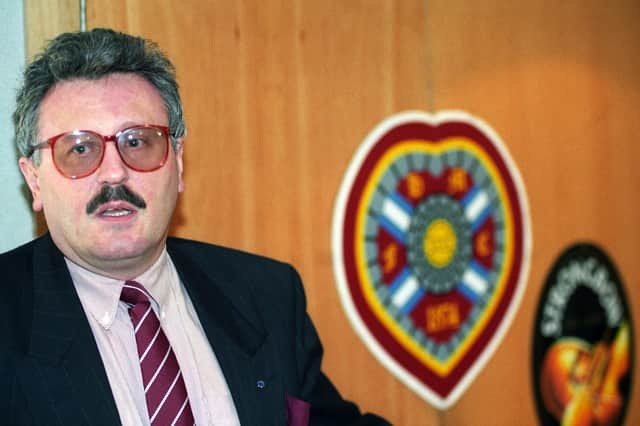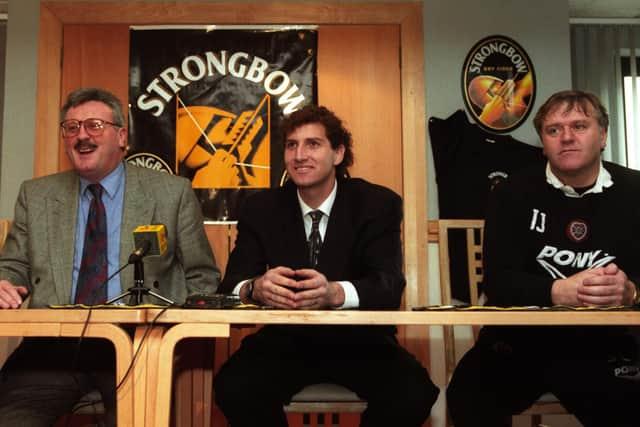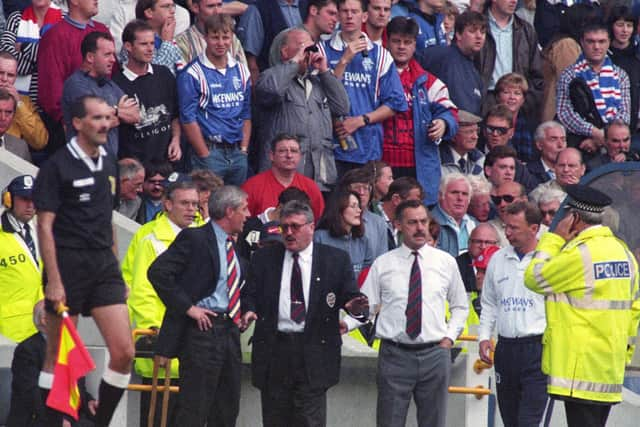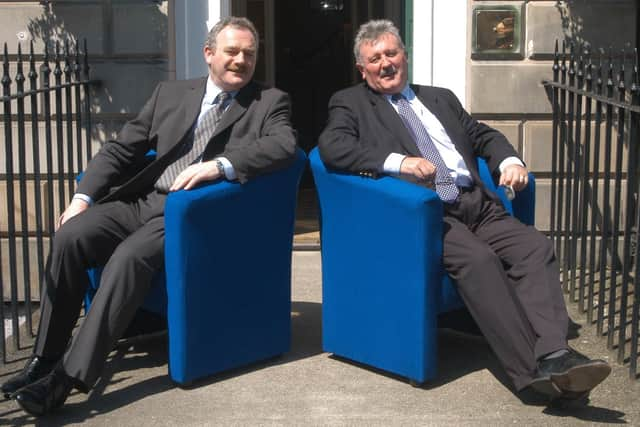Jim Jefferies in Chris Robinson Hearts tribute as he recalls infamous Ibrox afternoon 26 years ago: "We can't just pack it in!"


Every fibre of Jefferies’ being knew his destiny would be wrapped up with Hearts once more at some point. Nevertheless, a strong relationship with Falkirk chairman George Fulston meant he was caught between loyalty to his then employers and his considerable emotional attachment to Hearts when the Tynecastle club came calling (again) in the summer of 1995. Robinson, then chief executive, did not give up on Jefferies when others might have done.
“I’d been a Hearts supporter all my life, since a wee boy,” recalled Jefferies last week. “I had played for the club and the first opportunity to manage there…. you’d think it was a no brainer. And it was. But it is a sign of how much I had loved being at Falkirk and hated the thought of a lot of good work going to waste, which was maybe naive.”
Advertisement
Hide AdAdvertisement
Hide AdRobinson hung on while his No 1 target prevaricated. Jefferies even told his childhood club, the club he later skippered, to look elsewhere at one point. “It would have been easy for Chris to say, ‘oh well, he has made his decision, he’s gone back to Falkirk’," recalled Jefferies. "Who knows what might have been?”


This prolonged wrangling between clubs – and the Tynecastle board's etermination to prise their man from Falkirk’s clutches – is one reason why Jefferies was so saddened to hear of Robinson’s death last weekend, aged 71.
“A lot of people maybe think he and I didn’t get on,” he said. “That is not true. We had disagreements. Time is a great healer. Chris and his lovely wife Liz, we got on fine.”
It is an emotional time in any case for Jefferies, also 71. Last week marked the third anniversary of the serious heart attack he suffered while playing golf in Gullane. He is lucky to still be around to tell the story and sing the song of Hearts in the mid-to-late 1990s.
Along with his former associate Leslie Deans, Robinson presided over a period of huge controversy and no little success. He then paved the way for another extraordinary chapter to unfold by selling his shares to a certain Vladimir Romanov.


The Robinson-Deans revolution was a slow burning affair which ended, ultimately, in disharmony, evidenced most starkly in the breakdown of their own relationship. But there were good times, specifically the 1998 Scottish Cup victory over Rangers – Hearts’ first major trophy in 36 years.
Jefferies had wondered whether Robinson and Deans might come calling for him in the first instance, when they first took over at Tynecastle in 1994. However, Tommy McLean’s experience was preferred. After that didn’t work, Jefferies was eventually snared.
He recognised Robinson’s stand-offish demeanour might not work to Hearts’ advantage in the clubbable world of football. Jefferies insisted on Robinson coming with him to matches when he was on scouting missions around the country, introducing him to people he should know. “I tried to help lower the barrier he used to have,” he said.
Advertisement
Hide AdAdvertisement
Hide AdA League Cup defeat on penalties against Dundee at Dens Park and a loss shortly afterwards against Falkirk, of all teams, convinced Jefferies of the need for a significant overhaul. “Nobody could criticise the boys of the last ten years, they had been to cup finals and nearly won the league, but it was time for change,” he said.


Robinson was supportive. “I think the only time we upset him was when he was away on holiday and I signed a couple of players after getting the OK from Les,” recalled Jefferies. “Chris wasn’t sure if he would have allowed that to happen.”
The players? Davie Weir and Neil McCann, two of the club’s finest signings in the last three decades. “He didn’t complain, to be fair,” said Jefferies.
Weir and McCann were central to the Scottish Cup triumph over Rangers – still the most fondly remembered success of modern times for a certain generation of fans. “The preparation was first class,” recalled Jefferies. “Chris just said: ‘Whatever it takes’.” Robinson arranged for the Hearts team bus to pick the players up from Heathrow en route to their base at Stratford-upon-Avon, where Scotland had stayed during Euro 96. “I hadn’t asked for that,” said Jefferies. “Chris took it upon himself to organise it so we were picked up by the man who picks us up every week, which was a fantastic touch.”
Other little details like Hearts wearing their change strip against Rangers he was fully on board with. Jefferies remembers the “exceptional” support of the board at that time. “It was a different situation later on, it just didn’t work out between Leslie and Chris,” he added. “It was nothing to do with us. I was caught in the middle of it. One of those things. You have to accept that.”
Robinson didn’t always get his own way – Hearts remain playing at Tynecastle Stadium rather than Murrayfield, or elsewhere, after all. There was an ill-judged bid to move with Hibs to a shared stadium at Straiton. The plan – scrapped within months - was announced at an extraordinary press conference in Edinburgh’s New Town with Robinson and Hibs counterpart Rod Petrie sitting side by side on chairs.
There was also a strange incident in Majorca before a Uefa Cup tie against Real Mallorca in 1998 when the crossbar was higher at one end than the other due to the undulating pitch. Robinson was outraged.
A Uefa delegate in a mustard-coloured suit jacket was summoned from lunch. “You could tell he had had a few drinks,” recalled Jefferies. “He was as confused as anybody.” Hearts played the game under protest after the Danish official offered them an assurance that he would back them if they lost the tie, which they did narrowly – 2-1 on aggregate. Hearts complaint was later thrown out, much to Robinson’s chagrin.
Advertisement
Hide AdAdvertisement
Hide AdHe took fighting Hearts’ corner to extremes. No more so than at Ibrox 26 years ago last week, when they played the last 23 minutes with seven men after referee Gerry Evans sent off three players in a crazy seven-minute spell. David Weir, Neil Pointon and Paul Ritchie joined Pasquale Bruno in the bath, with the Italian having been red carded a minute into the second half.
“Neil Pointon was sent off for kicking a post!” said Jefferies. “How can you get sent off for kicking a post?” He still doesn’t know a quarter of a century on despite bumping into Graeme Allison, the linesman on whose say so Pointon collected a second booking for goalpost assault, on several occasions since.
An incandescent Robinson appeared on the touchline. He urged Jefferies to take the rest of the players off. “I said, ‘Chris that’s the last thing you do. The club could be fined – we can’t afford that. It’s also not a great look if we just pack it in'.”
Hearts eventually lost 3-0 – not bad when compared with Dundee United losing 9-0 to Celtic with the full complement of players as recently as last month.
Some voiced concerns about the unnecessary ruthlessness with which Celtic completed the task that afternoon. In 1996, the hosts took pity on Hearts. “To be fair, the Rangers players like Richard Gough were terrific,” recalled Jefferies. “They just knocked the ball about. They could have scored double figures when it got to four men short.”
That was Robinson’s concern. He hated seeing his club embarrassed. He did what any fan might have done if in a position where they wielded some power; try to get the game abandoned. “Listen, he was not everyone’s cup of tea,” said Jefferies. “But he was a strong Hearts supporter, he wanted the club to do well.”
It might be argued that Jefferies himself was responsible for Robinson having a significant say in recruiting him for the first of two spells as manager at Tynecastle.
Jefferies was in charge at Falkirk when they thrashed Hearts 6-0 at Brockville in 1993. “Chris told me he walked out of the ground that day knowing he had to try and buy Hearts,” recalled Jefferies. “He knew things were not right. That day made up his mind.”
Comments
Want to join the conversation? Please or to comment on this article.